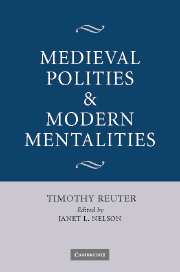Editor's introduction
Published online by Cambridge University Press: 12 August 2009
Summary
Grant that medieval history has any usefulness, and you see that this book is not just very useful but urgently needed. Compared with the amount available in English on medieval France, Italy and even Spain, relatively little exists onGermany, though it is an area that is beginning to receive increasing attention in the teaching of medieval history at postgraduate as well as undergraduate levels in the English-speaking world. Medieval Germany's size and diversity, its economic and political importance, and its cultural productivity, merit study for their own sake. The distinctiveness of medieval Germany suggests that studying it could have relevance for explanations of Germany's history in Europe in modern as well as medieval times. The sheer depth and volume of German historiography on medieval Germany, and German historians' tradition of reflecting deeply on methodology, means that here ‘general issues of interpretation and understanding’ can be addressed particularly effectively.
Yet there are obstacles. The study of the Middle Ages not only in the United Kingdom but also in North America has been skewed in favour of France, and to a lesser extent Italy, particularly since the First World War, for reasons that have a great deal to do with twentieth-century history and nothing to do with historical understanding. What Tim Reuter called Anglolexia, meaning inability to speak or read any language other than English, is becoming a form of cultural impairment increasingly widespread in Anglophone countries.
- Type
- Chapter
- Information
- Medieval Polities and Modern Mentalities , pp. xiii - xxPublisher: Cambridge University PressPrint publication year: 2006

